In and Out of Africa
The Bush Mechanics
Not surprisingly we sleep in this morning. It is fully 06:30 when we wake up and we doze dreamily for another hour before finally making the coffee. While we are just taking our first sips some locals come into the road scrape. 'Oh no' we thought, 'they are going to stand and stare at us. This lot didn't stand and stare. They came up to us and started shouting angrily. "You must go now, this is not your place". We were in no mood for this, still drained from the day before. We couldn't see why they were so set against us. This was one of the very few times we had encountered hostility on the trip, certainly the only time in Zaire (well apart from Kisangani and that doesn't count). We were probably less civil than normal, we felt we deserved a little peace and we were doing no harm. "We'll go soon" we said. They stood and waited until we showed signs of getting ready to go. Then we look around us. There are signs that we aren't the first tourists to camp here. We are surrounded by the detritus of tourism, beer cans and sweet wrappers. There had probably been a truck load of drunks partying on into the night and behaving in a generally arrogant fashion. Now the locals were venting their anger and frustration on us. They no longer had a welcome for tourists at this village. There had probably been tour trucks and loners like us stopping in this scrape for decades, yet one noisy truck can ruin all of that and tar all further tourists with the same brush. We almost felt like tidying up but the locals were hovering around, making sure we left them in peace.
We hadn't been long on the road when we met our mates in the beer truck again. They were stuck in yet another hole. This time there was a muddy track around the hole which looked like it had been designed for Landrovers. It would have looked perfectly at home in the training course at Solihull. I enjoyed sliding around and waving cheerfully as we continued on.
In one ditch there was a big American pickup truck, overloaded by an even greater margin than the full size trucks. We tried towing them out. Unfortunately the driver would keep trying to drive himself out at the same time and we only succeeded in dragging them further along the ditch. We finally worked out that the best method is to park the Landrover across the road at an angle from them, hook up the winch and slowly haul the vehicle out. It took a lot of effort to winch the pickup out of the ditch, much more than it had to pull our Landrover out of the small hole two days ago (only two days, it seems like a lifetime). The great advantage of our winch is that the Africans would pull the winch handle themselves thus saving wear and tear on both the truck and my own muscles.
This was the only American pickup we saw anywhere and it had probably been donated to some mission or other. It was obvious that tyres for American pickups were a rare commodity. The front tyre was so smooth it looked like they were driving on an inner tube. No wonder they kept slipping into the ditch. They were again surprised that we stopped and helped them as well as being amazed at the power of our small and very muddy manual winch. I was now very glad we had bought it.
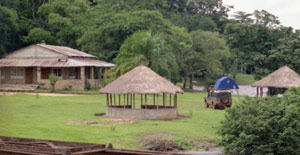 |
| Station de Capture d'Epulu |
|---|
We go straight down to the river to wash the mud out of our equipment. Enough mud came out of the winch alone to fill a small sized trailer. By evening we were feeling clean and almost civilised. Our tent was facing the river, a room with a view, overlooking a sign which said "No Nude Bathing". Which made one wonder what people had got up to before us. Somehow we are revitalised here. At other campsites we simply collapsed in exhaustion. Here we have more energy to enjoy relaxing without feeling numb and wasted.
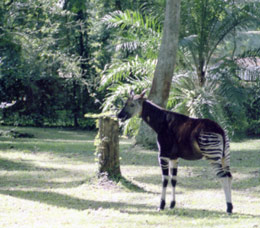 |
| An Okapi |
|---|
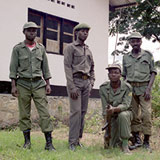 |
| Guardiens |
|---|
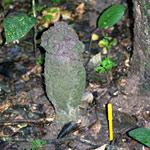 |
| Pygmy Termite Mound |
|---|
Whether we wanted to or not the tour just 'had' to go through a Pygmy village. This was the one we could have stayed the night in. Georges asked the Pygmies to line up for a photograph. One of them was wearing a 'T' shirt. Georges waved his gun in his general direction and did the international sign language for 'Take your shirt off for the photo or else'. We rapidly did the sign language for "No no, leave the shirt on it's OK really. Perhaps this means our photo's don't look as 'authentic' as National Geographic. Instead they show reality as we saw it, not how it's supposed to look.
We didn't want to buy any spears from these Pygmy either and they now expected something in return for letting us photograph them. We didn't have any money on us, after all who carries money on a 'bush walk', we did have a couple of coloured pens and some sultanas. We had brought these all the way from Europe in case we ever had a craving for something sweet. A jungle walk required some form of 'trail mix' and a packet of sultanas was all we had. The Pygmies had never seen anything quite like them before. The first few mouthfuls were very tentative but they were soon smiling and happy. I can imagine tourists for years to come being hounded for sultanas and never having any to give away! We then headed straight back to the Station. When we reached the road there was a local woman walking towards us. She was laughing and making the motions of putting food into her mouth. I asked Georges what she was laughing at. "She is laughing about the sultanas". They talk of the bush telegraph but I heard no drums and I couldn't see any telephone wires. I had a vision of us pulling into villages for the rest of the trip and being greeted with cries of "sultana, sultana".
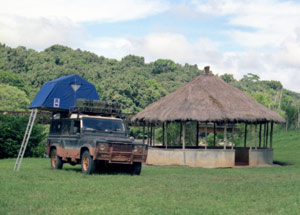 |
| The Truck Relaxing |
|---|
Two motorcyclists rode up, they couldn't be Eric and Brian as they had signed the visitors book a couple of days earlier. They stopped and took their helmets off. They were the two Dutch guys who had also stopped at the mission in Cameroun. It was always good to see familiar faces, to hear their adventures and to find out about any other travellers we knew in common. After a while almost every traveller you would meet would have met one or more other travellers you knew. They had seen Cyn and JÉrgen in Kisangani. It was a relief to know that they had recovered from their illness and had made it out of Bumba on a river boat. We would probably never see them again as they were now many days behind. Probably the saddest part about travelling is all the people you meet, share a few hours or days with and then never see again.
We managed to see the okapi again though, this time in the afternoon. They get quite frisky and excitable in the afternoon, shaking their heads and wandering around the paddocks. In the wild they are solitary animals in the bush and are therefore kept in very large paddocks, usually containing only one animal. They seemed quite different prancing about like this and it was well worth going back for the second look.
One of the African game keepers at Epulu was running a kind of book swap library for travellers, he would swap any book one for one from his selection and he kept a note of the books which came and went. I think this was part of a research project "Reading habits of the Overland traveller". We swapped a Desmond Bagley adventure novel and a couple of Larry Niven Science Fiction books for a couple of books about the Kalahari Bushmen and a book about Chinese opium traders. That little transaction will probably appear as a dot marked 'experimental error' on his final results.
We left the next day, swapping names and addresses with the Dutch guys and said our farewells knowing that we would probably never see them again.
A few kilometres down the road, in Mambas, we meet two tour trucks full of tourists driving from East Africa to Europe. Usually when any travellers met on the road they would stop and talk. Some of these tours last for over six months and the trucks seemed to be very self contained. Often the passengers didn't seem to have the same need to communicate as other travellers. The passengers on these two trucks seemed particularly subdued and uninterested in talking. We found one passenger who didn't mind chatting and discovered that the main road route to Beni was closed due to repairs and they had taken the short cut. This road was particularly narrow and had proved difficult for their large trucks. It had taken them four days to drive from Beni. They were already feeling worn down by Zaire. Little did they know how much more Zaire there was to come.
We did learn that visas were going to become necessary for British passport holders travelling to Uganda sometime in the next few months. The border officials had already started charging people for entry without a visa. The people on one of the trucks had paid on the spot and then managed to recover the money through the British Embassy later, although it had taken them several days to do so.
We decided to take the same short cut as they had to Beni, the driver of the truck said that most of the problems had been because they were too big. This sounded like the right kind of road for a Landrover. The big trucks didn't usually use this road. Instead the main traffic was Toyota 'stout' utilities, seeing as these were about the same size as a Landrover with smaller wheels and two wheel drive this road was ideal for us. Thick sticky mud without the hard, transmission destroying crests. Driving was fun again.
Not far along the road we came across some locals in a Toyota 'Stout'. They were heavily overloaded, perhaps to an even greater proportion than the larger trucks and there were about ten people riding on top of the load! They had slipped into the ditch and were having difficulty getting out. I asked some of the people to get out of the road so we could drive past and tow them out. "Can you help us" someone asked. "Yes", I said, "If we can get past you". They got out of the way and we drove past with ease and stopped. "You are going to help", the same man said with surprise. "Yes, I said we were, didn't I", I replied. Again they seemed to find it hard to believe that we really were going to help them. There must have been a lot of aloof white people drive through without stopping in the past. Rather than attempt to tow them out I hooked up the winch straight away. Everyone who had seen the winch in action before had been surprised and impressed, these were no exception. We then headed off while everyone piled on to the top and got comfortable.
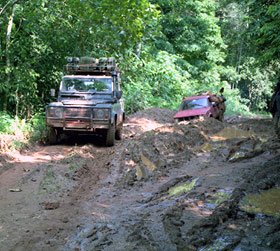 |
| The Truck and Toyota Stout |
|---|
The driver of the Stout was looking at his alternator with a puzzled frown. "Wait", I said, "I have the very thing". I went off in search of a pin. This time I didn't have to worry about getting the sewing drawer dirty. Everything we owned was uniformly dirty anyway! I poked the pin in the special little poking hole and the alternator slipped in place with a satisfying click. They then started to take the suspension apart, which looked like a long and rather involved task. I think they were hoping I would produce the correct tool once more. I had just about run out of esoteric tools, there was only the torque wrench and 'Iron Bull' (the worlds largest adjustable spanner) left. So, before my image was destroyed, we drove off, taking one of the passengers with us.
The road was muddy and slippery yet driveable, the locals were happily under the misapprehension that I was the worlds greatest mechanic. The tour truck driver hadn't mention any big holes from here to the border and we were feeling pretty good. Then we came across 'the bridge over the Ituri'.
To say a few of the planks were missing is an understatement. Over a third of the planks which should have been there were gone. The bridge was about 150 metres long with a very long drop to the Ituri below. It was constructed with a grid like metal base with planks laid on top. The holes in the grid were about a metre by 60 centimetres in size, large enough to drop a wheel straight through and the metal of the grid was badly rusted. Slipping off the planks and catching a wheel in the grid would be a bad thing to do. Apart from any damage to the truck and the problems of retrieval halfway across the bridge, there way a very real danger of falling through. We carefully walked across the bridge and started to feel sick. A local driver came across towards us. He drove very fast across the bridge, the track one plank wide under each wheel. When there were no more planks his helpers would rush up with some planks from behind and put them in front. There barely seemed enough planks when he started up again and accelerated madly towards our side and safety. One of the planks snapped under his rear wheel and fell through the gaps in the bridge eventually splashing in the river below. He managed to get his wheel onto the next plank just in time.
Another vehicle was coming up to the road on the other side, they would send their helpers across to fetch some planks from our side. I had to get into position quickly and stake my place on the bridge or we would never get across. Before I had time to get really scared we had replaced the plank which had dropped through and I was on the bridge. The start was one plank wide under each wheel, with a section of two planks in the middle. There was no one to guide me slowly across. I had to drive quickly and accurately, unsure that the planks were in the right position for our truck. The bars of the bridge were flashing past to the sides, I was concentrating on the planks ahead, trying not to look too closely. If I looked at the planks on one side too closely I would veer towards them. When there is one plank under each wheel you have no room to veer. There was still a third of the bridge to go when I ran out of planks. I braked rapidly but gently, to skid on the slippery planks would have been a disaster. For a few seconds I just sat in the truck waiting for my heart beat to slow, my hands to steady and my stomach to catch up. With great care I got out of the truck. I looked down at the river below through man sized gaps in the bridge. The front wheels of the truck were less than a metre from the end of the plank. The rear wheels were less than a metre from the beginning of the plank. There were no planks behind the truck and no planks in front. My heart nearly stopped until I realised that some locals had already started moving planks for me and there had been planks while I was driving across. Another few seconds past and I went to pick up a plank. After the planks on the earlier bridge I was expecting to lift quite a considerable weight. It was so light I lifted it far to rapidly and lost my balance. Not only were these planks in short supply, they were completely rotten. I could now drive a few plank lengths further across. The helpers from the truck coming the other way were now getting impatient at my slow pace across and were also shifting planks for me. The boy was waving "come on, come on". I shook my head. Driving on one plank width was bad enough, I expected the planks to at least touch end to end! They shuffled the planks until I was satisfied. One last burst of speed and I was across. "How can you do this every day" I asked the driver of the Toyota. He shrugged and smiled in resignation. "This is Africa" he said, as though that was all the explanation necessary.
Fiona walked across the bridge and met me on the other side. "I don't want to do that again", I said, "Did I tip any planks in on the way?". "I don't know", She replied, "I had my eyes closed, I couldn't watch".
That night we stayed in the mission school grounds. They were proud of their classrooms, which had no glass in the windows, no doors and a leaky corrugated iron roof. They suggested we spend the night in the classroom rather than in our tent. There was going to be another tropical storm that night and a classroom with open windows and a leaky roof didn't sound like a good deal. We politely declined their offer. They did let us use the priest's toilet though. This was simply a small dark hut which had a hole in the ground and some old newspaper pushed into the walls as toilet paper. If this was the special luxury toilet for the European priest what was the children's toilet like! There was indeed a tropical storm that night and we were glad to be in our nice waterproof tent. Fortunately in the warmth of the tropical morning it would only take an hour to dry the tent out before packing it away. The teachers asked us if we could give something for school, especially medical supplies. We left them some paracetamol tablets, some plasters, a bandage and some coloured pens. They also asked us to take a photograph of the school and the children. All the children lined up for the photo, just like a school photograph anywhere in the world. We did eventually post them an enlarged copy of the photograph. I like to imagine it on the wall of the classroom next to the blackboard, if it ever arrived that is.
On the road again and after a few kilometres we came across our passenger from the day before. He had set off at dawn to his destination. He must have been the African equivalent of a travelling salesman. He was quite well dressed (certainly better than we were) and had an old briefcase. The four or five day walk between villages was normal for him and he considered a lift as a bonus. Not much further on we met our friends in the Toyota. They had obviously repaired their suspension, or at least put all the components back in something like working order. They were waiting at a hole for some other vehicles to pass through. I half expected them to start taking something else apart at any moment. This time they let us drive through first in case they got stuck. Which was fortunate because they did. We attached the tow rope and had them through in no time. The next hole was particularly long and muddy. They decided that we should attach the tow rope before we started off and effectively tow them through. "You can make it through on your own", I said. "Your vehicle it is Stout, Stout", He said. "So is yours, look it says Stout on it". He pointed at the Landrover. "It is not Stout like this". There was no arguing with that logic. This time I was so concerned with watching the tow rope in my mirror that I didn't pay enough attention to my own path through the hole and got bogged down. It only required a couple of people pushing to get us through though. The 'Stout' driver got through without getting stuck after all!
We left them behind again as it looked suspiciously like they were about to take something else apart and headed towards Beni. About this time I noticed that the red brake warning light came on occasionally when I braked hard. The brakes had seemed a little ineffective recently, which I had put down to their being wet. I decided to investigate when we arrived a Beni.
In the rest of Zaire the old colonial buildings had either been destroyed in the unrest around the time of independence or had merely decayed. The new campsite was in a part of Beni where many of the old buildings had survived and gave an insight into what life would have been like for the Europeans during colonial times. The campsite was in the compound of a restaurant. It had a view over a wide valley and the gardens were cultivated with flowers and lawns. All around were similar beautifully kept gardens and houses. There was even a new shower block with clean flushing toilets, luxury indeed.
The restaurant seemed out of place. It had imitation palm trees and a tropical island backdrop. The type of place I would have expected in a small town in England with a name like 'Hawaii delights'. The food however was excellent, a huge plate of roast beef, salad, beans and potatoes. After the lack of available food in the rest of Zaire (there had been a couple of days when all we had to eat was bananas) this was like a horn of plenty. These were the first potatoes we had seen since England. Most of the food here was imported from Uganda and the supply was erratic. Too erratic to run a restaurant, which is why they had opened a campsite. For us it was a banquet beyond our wildest dreams and it only cost $6 US for both of us! That was real US dollars though, from our secret store of undeclared small denomination US dollar bills.
I spent the whole of the next day taking brake components apart and looking for leaks, I couldn't find anything wrong, although the front brake shoes, which were new before we originally left England, were now almost worn out. There seemed to be a problem with the brake master cylinder yet all the rubber bits looked OK. We couldn't find any Landrover parts in Beni so we decided to drive to Uganda, which was only 80 km away. The rear brakes appeared to work enough to stop us if we tried hard enough.
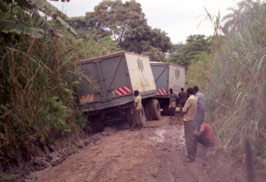 |
| Zaire - the final traffic jam |
|---|
Eventually we squeezed past the trucks and arrived at the hole. We waited for a while and let an army Mercedes drive through. The army method was to drive through as fast as possible with little regard to any resultant damage. They got through quickly and easily. I drove through in my usual slow controlled fashion and got stuck. This time Fiona was at the other end of the hole watching and had seen the crest collapse under the wheel. If I had been going slightly faster I would have made it. Some guys produced a tow rope and hauled us out with their truck. "I'm sorry I got stuck", I said. "I should have gone through faster like the army guys". "No", said the African driver, "You have respect for your vehicle, you have a long way to go and it is the only one you have. They do not care". He looked distastefully in the direction the Army vehicle went. I felt a little better after that. Especially as this particular driver was obviously well respected. He was hopping from truck to truck and shuffling them all through this particularly difficult patch. I find it hard enough jumping from car to car on tar sealed highways, let alone between radically different trucks, all with their own special mechanical problems, and taking them through a Zaire mud hole.
We gave a couple of guys a lift to their truck which had a 'small problem'. They literally hung on to the back of the Landrover. They said their truck was only 'a short distance, go very straight'. It was 10 km! They were quite happy hanging on the back though. We could easily see the 'small problem'. The truck was on its side! This was a common occurrence on this stretch and we saw several vehicles in this state. We saw more vehicles stuck or broken or simply waiting along this 76 km stretch than in the whole of the rest of our route through Zaire. The only good thing was that, even though we were going a little more slowly than Central London in the rush hour, we were at least moving.
Then some people with guns and in something resembling a uniform flagged us down. We couldn't tell if they were army or bandits. The AK47s suggested that stopping would be a good idea. "You will take these men and their equipment to the border". Their equipment was several large heavy looking boxes. "We can't carry that it's too much". They didn't see it that way. The idea of a vehicle being overloaded while there is still some space left is beyond the comprehension of these people. "Besides we have only one spare seat". The soldier in charge pointed to the roof. "What is wrong with there?", they asked. "No no it is not safe". There then ensued a long period of discussion. At the end of which we had agreed to carry one man and an ammunition box to the border. I opened the back door and before I realised what was happening there were two heavy ammunition boxes full of loose rounds and three kitbags in the back. I was a little concerned at loose rounds bumping about in the back. Fiona use to be in the Navy and assured me that this was perfectly normal. I had my doubts. We had little choice in the matter and on we went with Abdulla the soldier. A man of few words who sat with his hands over the hole in the business end of his AK 47. It was now 17:00 hrs and we were only 24 km from the border.
The road ahead was blocked by an articulated truck (tractor-trailer rig) whose trailer had slipped into the ditch. Somehow we were persuaded to try towing this thing. "We can't tow that!". I said imagining that it was full of the heaviest goods available. "It is empty, empty", they said. "Let me see inside". I said. "I've been travelling in the back and it is empty", said a white sounding voice. The voice belonged to an Israeli, South African called Graham. He was travelling on an Australian passport as both his other ones were unpopular in this part of the world. Spurred on by a picture we had seen in Kampala of a Landrover towing a very similar truck on the flat I decided to give it a go. We had already discovered that the local drivers didn't know how to get out of ditches when being towed. These guys were no exception. With a supreme effort the Landrover just managed to pull the big truck, unfortunately they kept steering it back into the ditch. We tried the trusty winch, a remarkable tool which, like the Landrover, was being asked to perform beyond its limitations. Even with two strong men trying to pull the handle it wouldn't even start to move. This looked very much like the end of the road for today so we turned back to the national park guard post a kilometre away with Graham hanging on the back. Having a real soldier with us meant that we could effectively stay anywhere we (or rather he) wished and the park guards cleared a hut for Abdulla and Graham to sleep in. Graham had been in the South African armed forces (or maybe Israeli or both) and when he saw Abdulla's AK47 it was like meeting an old friend. "Can I have a look" he said. Before Abdulla could bat an eyelid the AK47 was completely stripped down, probably for the first time in years. He told us later that it only had three bullets in the clip. It wouldn't take long for that to empty on 'automatic fire'. It was still three too many loose rounds for my liking.
Graham was on his way to Goma to see the mountain gorillas. This is a popular destination for tourists in Zaire. For one hundred US dollars each (in hard foreign currency) you could feel like David Attenborough or Sigourney Weaver and sit with mountain gorillas in the bush. The guides knew roughly where they were and almost guaranteed to find them within a day, often within two hours. We didn't have two hundred dollars to line some Zairois pockets so had decided not to go. We might have considered it if any of the money had gone towards the preservation of the gorillas. Sadly, I doubt very much that this was the case. Graham was supposed to be meeting his friends there tomorrow and he was beginning to wonder if he would make it. According to 'Shoestring' the journey from the border to Beni would take 5 hours. He had already taken a day to get 30 km. He had no food or even a water bottle for such a short journey. The next morning we gave him one of our small two litre water bottles for the journey and suggested to him that walking around obstacles would be quicker than waiting for his lift to get through.
Fortunately the truck had just managed to get out of the ditch when we arrived and we carried straight on to the border. An official started to search the truck. He opened one of the ammunition boxes and looked at us with a 'This little problem will require a very large bribe' look. "They belong to him!" We replied in unison. Abdulla the silent soldier said nothing. Fortunately the official was convinced. He looked at an almost empty notebook and our little library and said, quite openly and in very clear English. "Give me this or one of those books. If you don't I will have to search the vehicle very thoroughly and you will be here for many hours". I looked at Abdulla and hoped he would do something about this. He obviously had plenty of time on his hands and said nothing. To be fair his English was very poor and he probably didn't realise what was going on. I was very tempted to say "Go ahead we have all day". Then I remembered our copy of 'A Bend in the River'. This scathing indictment of corruption was a fitting gift to the most openly corrupt official so far in Africa. As we left I hoped he would read it and begin to understand. Even better I hoped he would give it unknowingly to his superior without reading it first.
Next we had to drop Abdulla off. As we turned into the Army guard post we must have been wearing our best terrorist expressions. Men began swarming warily out of huts with AK47s at the ready. I was getting ready for the first bullets to hit the tyres and stopped rapidly. Abdulla got out and the ammo was removed and no one said thank you. At least they hadn't shot at us or asked for money.
The Uganda border post was still about 5 km away when we saw two more soldiers walking to the border. In one last gesture of kindness we suggested they hang on the back. We slowed down as we neared the guard post and they jumped off. The guards waved for us to stop and one of them began looking in the back with a 'this is the last chance for us to extort money from foreigners and we are going to make the most of it' gleam in their eyes. The two soldiers who had been on the back shouted something. Whatever they said made him change his mind. He didn't want anything after all and, smiling, let us pass.
"Look at that" I said. There, just after the Uganda border post, was a one lane bridge. On one side was the Zaire dirt road. On the other was something we had almost forgotten existed. A tar sealed road.



